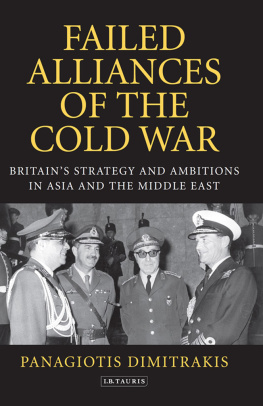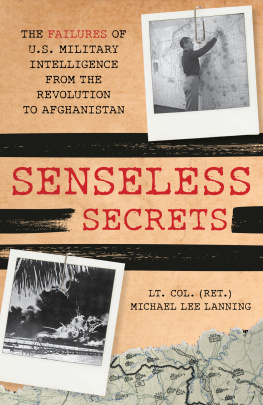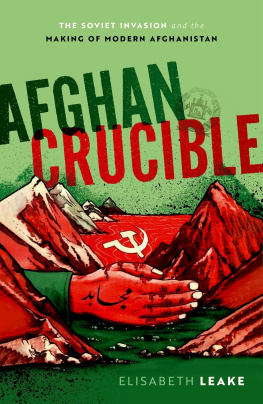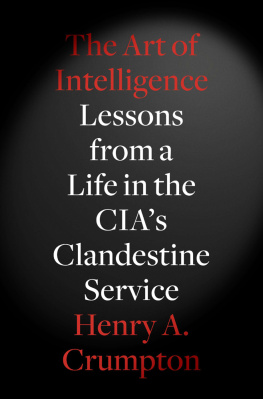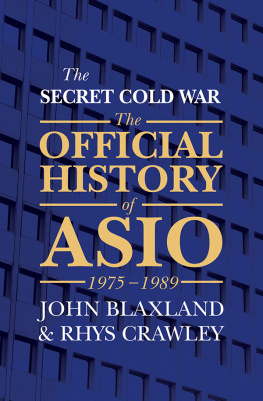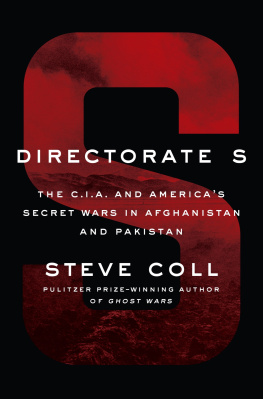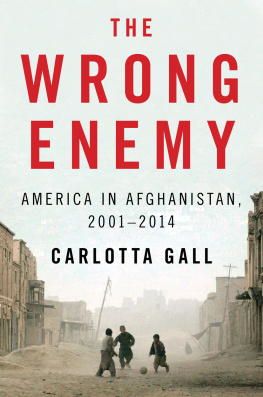Panagiotis Dimitrakis specialises in Cold War and intelligence history and obtained his PhD in War Studies at Kings College London. He is the author of Greece and the English: British Diplomacy and the Kings of Greece (2009); Military Intelligence in Cyprus: From the Great War to Middle East Crises (2010); Greek Military Intelligence and the Crescent: Estimating the Turkish Threat Crises, Leadership and Strategic Analyses, 19741996 (2010); Failed Alliances of the Cold War: Britains Strategy and Ambitions in Asia and the Middle East (2012).

Published in 2013 by I.B.Tauris & Co Ltd
6 Salem Road, London W2 4BU
175 Fifth Avenue, New York NY 10010
www.ibtauris.com
Distributed in the United States and Canada Exclusively by Palgrave Macmillan
175 Fifth Avenue, New York NY 10010
Copyright 2013 Panagiotis Dimitrakis
The right of Panagiotis Dimitrakis to be identified as the author of this work has been asserted by the author in accordance with the Copyright, Designs and Patent Act 1988.
All rights reserved. Except for brief quotations in a review, this book, or any part thereof, may not be reproduced, stored in or introduced into a retrieval system, or transmitted, in any form or by any means, electronic, mechanical, photocopying, recording or otherwise, without the prior written permission of the publisher.
Library of Middle Eastern History, vol. 39
ISBN 978 1 78076 419 1
eISBN 978 0 85773 377 1
A full CIP record for this book is available from the British Library
A full CIP record for this book is available from the Library of Congress
Library of Congress catalog card: available
Typeset by Newgen Publishers, Chennai
LIST OF ABBREVIATIONS
ASEAN | Association of Southeast Asian Nations |
AGSA | Department of Defence of the Interests of Afghanistan (pre-1979) |
CENTCOM | Central Command (US) |
CIA | Central Intelligence Agency |
CWIHP | Cold War International History Project |
DIA | Defense Intelligence Agency (US) |
DShK | Heavy Machine Gun (Soviet Union) |
FCO | Foreign and Commonwealth Office |
FCD | First Chief Directorate (KGB) |
FRG | Federal Republic of Germany |
GDR | German Democratic Republic |
GID | General Intelligence Directorate (Saudi Arabia) |
GRU | Soviet Military Intelligence |
INF | Intermediate-Range Nuclear Forces Treaty (1987) |
ISI | Inter-Services Intelligence Directorate (Pakistan) |
JIC | Joint Intelligence Committee (UK) |
KGB | Committee of State Security |
KHAD | Afghan Government Intelligence Agency (after 1979) |
MI6/SIS | Secret Intelligence Service (UK) |
NATO | North Atlantic Treaty Organisation |
NSA | National Security Agency |
NSC | National Security Council (US) |
PCC | Politburo Central Committee (Soviet Union) |
PDPA | Peoples-Democratic Party of Afghanistan |
RPG | Rocket Propelled Grenade (Soviet Union) |
SAS | Special Air Service (UK) |
SALT II | Strategic Arms Limitation Treaty II |
SEZs | Special Economic Zones (China) |
Spetsnaz | Soviet Special Forces |
Stasi | East German Secret Service |
USSR | Union of Socialist Soviet Republics |
ACKNOWLEDGMENTS
Special thanks go to Rosalie Spire for her research aid as well as to Joe Maiolo, Professor of International History at Kings College London for helping me with key sources. The staff at the National Archives, Kew deserves a special mention as well as Olympia Wood, John Wood and Peter Barnes for their help in copy-editing. I would like also to thank my editor Tomasz Hoskins at I.B.Tauris for believing in this monograph and working towards its publication. Finally, I owe a great debt to my family for their support.
PREFACE
Afghanistan has been and remains a country to which foreign armies have always seemed to return, from the time of Alexander the Great to todays NATO counter-insurgency operations in support of the Afghan government. This far-distant country of inhospitable mountains and desert plains has never enjoyed strategic resources such as oil, and was deemed valuable only in connection with the Great Game the Anglo-Russian rivalry in the nineteenth and early twentieth centuries. Throughout the centuries the different tribes and ethnic groups inhabiting Afghanistan fragmented, and undisciplined by central authority could not readily understand why foreign peoples were so much interested in their poor lands. Eventually, however, they would turn guerrilla warfare from an art into a science having grasped its elements only too well.
The Cold War affected Afghanistans importance vis--vis the superpowers and their allies. To what extent, however, this country seemingly a member of the non-aligned movement, but by the late 1970s in reality a protg of the Soviet Union was of genuine strategic value to the West remains debatable, for historians and scholars of international relations alike. Indeed, recently declassified UK and US archives show that, in the eyes of British and American planners, Afghanistans strategic value was limited. Yet the Soviet incursion there in 1979 which was seen by the West as following the pattern of two earlier such invasions, Hungary in 1956 and Czechoslovakia in 1968 induced Western diplomacy and intelligence services to take an active interest in helping the Islamic guerrillas to oust the Soviets. In an irony of history, the unintended consequence was the rise of Osama bin Laden and al-Qaida. The Arab (and Chinese) proverb the enemy of my enemy is my friend may be the most deceptive and dangerous assumption for strategists keen to take advantage of a conflict.
Afghanistan put a mark (or a stain) on leaders tenures: Leonid Brezhnev, the USSRs chairman, crippled by illness and now frustrated with dealing with Afghan leaders who were fighting and killing each other in successive coups, took the fateful decision to invade in 1979. He died three years later, while Russian troops performed miserably against the then equally badly led Mujahedeen. Yuri Andropov, the first KGB chairman to rise to become head of the USSR, and Konstantin Chernenko, who succeeded him, were too old to change their mentality and opt courageously for a rapid exit from Afghanistan. Andropov himself was obsessed with the possibility of a surprise US nuclear strike. Ironically, while the White House was informed of these paranoid fears, the CIA discounted their impact on Soviet foreign and defence policy. It was left to Mikhail Gorbachev to end the war in Afghanistan, to complete the Soviet withdrawal in February 1989, and two years later to seal the fate of the USSR itself.
President Jimmy Carter, a strong supporter of dtente who always sought to bring respect for international law and human rights into USSoviet relations, was surprised and confused by the events in Afghanistan; the fall of the Shah of Iran in January 1979, and later the taking hostage of the US Embassy staff in Tehran, shattered his profile as a superpower leader. Americans realised that the administration (with the worlds largest annual defence and intelligence budget) could do nothing to save the hostages from the hands of the new fundamentalist regime in Iran. This feeling of helplessness led Carter into the desperate decision to give the green light to a catastrophic military rescue mission, costing the lives of eight servicemen and failing to release a single hostage. Predictably, he would lose the presidential election of 1980. Ronald Reagan took over, unleashing in his second term the full-scale secret arming of the Mujahedeens war against the occupiers of Afghanistan, while attempting, in vain, to convince the Islamist groups to view the Americans as allies. Nonetheless, the Afghan guerrillas and their allies proved themselves sufficiently astute to secure sophisticated Stinger missiles from the US, while continuing to hate their benefactors.
Next page

